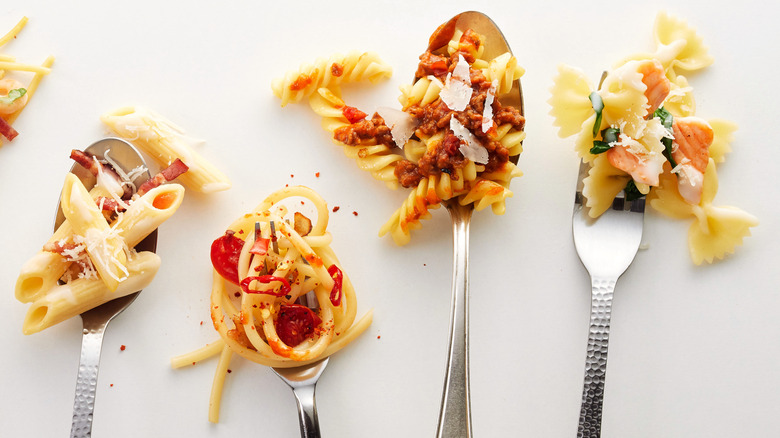The Trick For Fixing Overcooked Pasta
So, you spent time deliberating between the best types of pasta for your sauce and made the perfect decision, only to get distracted and leave the pot on the stove for a bit too long. According to Bon Appétit, even al dente pasta is overcooked (since you'll be cooking it further in your sauce), so that mushy rigatoni staring back at you is way past prime.
We have more bad news before we get to the good: Livestrong reports that overcooked pasta has a greater impact on blood sugar levels. When noodles are cooked, according to La Cucina Italiana, the gluten absorbs starch, and starch absorbs the water the pasta is boiled in. If you overcook the pasta, then, both its starch and nutrients are cooked out and left in the water.
But not to worry, soggy noodles still have a chance at a second life. Whether you've boiled your cascatelli or fettuccine for a few minutes too many, we have some tricks that can help rescue your meal.
Get creative with the pasta you have
Instead of chucking your mushy pasta into the nearest bin, simply adjust your stove's flame to medium and warm up a sauté pan. Lightly coat the pan with your choice of cooking oil or butter, then slide the soggy noodles into the pan and lightly stir until the pasta is browned in places. This is HuffPost's recommendation for salvaging overdone pasta, and the site also suggests tossing in extra ingredients that have crunch — think hearty vegetables like carrots, broccoli, or snap peas — to distract your senses from any remaining mushiness. Use cheese and other fixings, such as a tangy tomato sauce or creamy Alfredo, to make it taste delicious despite the texture.
If you want to give up on the traditional pasta concept entirely, there are plenty of clever uses for pasta you've never thought of, from crisping it up into a frittata with eggs and cheese, to serving it in stuffed peppers or even a sub sandwich. Whatever you decide, your overcooked pasta is definitely not destined for the trash.

